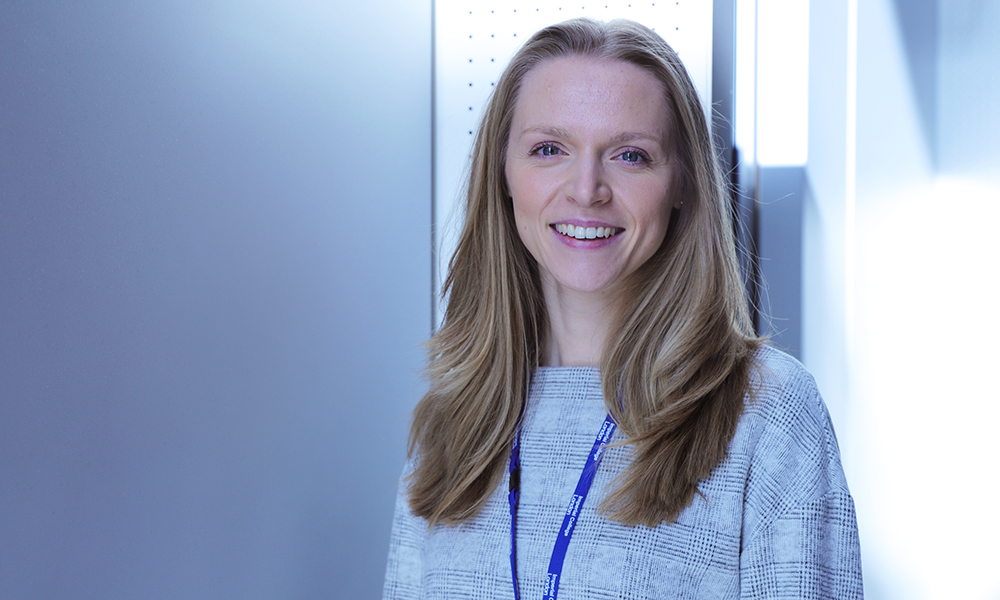
In the latest instalment of our Staff Profile series, we spoke to Georgia Levey about her role as Coordinator for the Centre for Translational Nutrition and Food Research, the importance of collaborative research and working to tackle major challenges in global health.
Introduce yourself – who are you and what do you do?
I’m Georgia and I’m the Coordinator of the Centre for Translational Nutrition and Food Research, which is based in the Department of Medicine.
When did you first join the Department, and where did you work or study before this?
I joined in September last year, so I would say I’m still fairly new. I have an undergraduate degree in Nutrition from King’s College London and after graduating I decided to go into the charity sector. Before coming to Imperial, I worked for the Jamie Oliver Food Foundation as a Campaign Coordinator – if you’ve heard of the sugar tax, that’s what we worked on. It was an exciting job and I enjoyed seeing the impact we made.
When I left the Foundation, I still wanted to have a job that involved helping people in some way. My role at Imperial is just that, as I believe I am helping to encourage multidisciplinary research that will hopefully have a positive impact on society in terms of nutrition and health.
What’s been the biggest highlight for you since taking up the post?
When I started my role, we were the Nutrition and Food Network. Very soon into the job we applied for Centre status and were successful! I think this was a pretty good achievement so early on.
What’s the most interesting part of your role?
I really enjoy learning about the different projects and research that the academics and students are doing. I support one project called the HUNGer Project which is looking at how to improve health outcomes in children with undernutrition in low- and middle- income countries. The project directly addresses the United Nations Sustainable Development Goal 2 (SDG-2): End hunger, achieve food security and improve nutrition, and promote sustainable agriculture. It’s amazing to think the work we are doing could have such a positive impact on the major global challenges we face. The team behind this project is also fantastic and it’s a privilege to work with experts in this field.
What’s the most difficult aspect of what you do?
I think getting used to how big the College is. Having worked for much smaller organisations I’m not used to it, so it’s taken time for me to adapt. It’s exciting though, as it means I meet lots of interesting people every day. For example, I recently met a honey expert, which I found fascinating!
What would you say is the biggest misconception people hold about what you do?
I think a lot of people are still unaware of the Networks and Centres and their purpose within the College. I think if people were more engaged with them we could see some amazing things happen, as essentially the essence of the Networks and Centres is to grow multidisciplinary connections both within Imperial and with external partners.
The Centre for Translational Nutrition and Food Research comprises academics from many disciplines across the College, including engineering, business, chemistry and natural sciences. We believe that in order to tackle the global issues in nutrition, food and health, it’s important to extend the strength and capability of our research base. The Centre is open to anyone who would like to be involved and welcomes academic diversity.
What’s one thing you’d like to change about the College’s working culture?
I think the College does a lot to ensure a positive and prosperous working environment for its staff. There are many opportunities for professional development and learning. Almost every week there is an event or lecture you can attend. Recently, I went to a seminar on ‘why we sleep’ as part of the Sleep Imperial Campaign, which was very interesting.
If I had to change anything, it would only be to further enhance collaborative research within the College, but Imperial is already doing a great job of this!
Where do you see yourself in five years’ time?
This is a hard question! I am still learning a lot in my role and developing new skills all the time. This is really important to me, so as long as I’m still improving while also working in something meaningful, then I’ll be happy.
What are your biggest hobbies/passions when you’re not busy at work?
I love cooking and photography. I am also intrigued by food from different cultures, so I really like travelling to different countries and trying a local delicacy or cuisine.
And finally: if you were exiled to a desert island but allowed one luxury item, what would it be?
Am I allowed to take my dog Alfie?
Find out more about the Centre for Translational Nutrition and Food Research